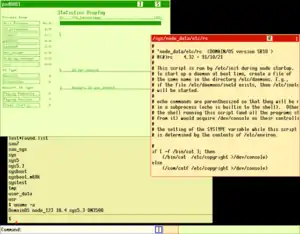DM (windowing system)
DM (Display Manager) was the windowing system used by Apollo Computer Inc. for its Apollo/Domain line of workstations running the AEGIS operating system, later renamed Domain/OS. DM was integrated with the operating system's own window manager known as wmgr (Window Manager).
 | |
 | |
| Developer(s) | Apollo Computer |
|---|---|
| Initial release | 1981 |
| Operating system | AEGIS, Domain/OS |
| Type | Windowing system |
Overview
Apollo's DM, first shipped in 1981, was the first commercially successful general purpose window system. It preceded systems from Sun Microsystems, X, Apple, and Microsoft, and contained some features that are still not found in similar systems today.
The DM contained two built-in functions, an editor and a transcript, which is a kind of virtual terminal. Additional functions could be added by user programs. One of the unique features of the DM was "universal editing". All text in any of the built-in windows could be edited using the same editing language. This included the history displayed in a transcript window, although that text was read-only. In addition, the history was unbounded. It started from the birth of the process to which it was attached, and older history was never deleted, as it is in all virtual terminals today. Another interesting feature was that each transcript was attached to a mini-input window where the process input could be edited using the same editing language used elsewhere.
The DM suffered from the fact that it was not portable, and was tightly coupled to the Apollo operating system. Eventually all of the Apollo software, including the DM, was phased out after Apollo was bought by Hewlett-Packard in 1989. The X Window System ultimately became the dominant window system for Unix (and later Linux) systems.